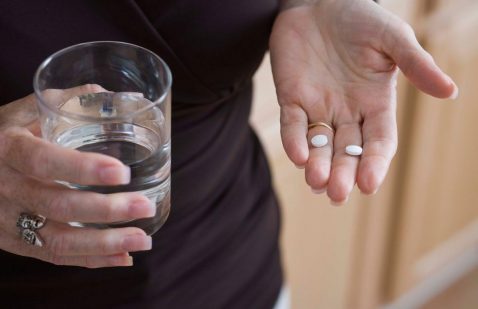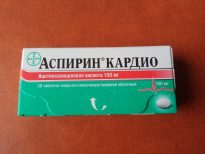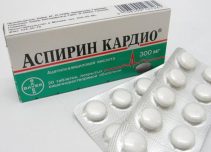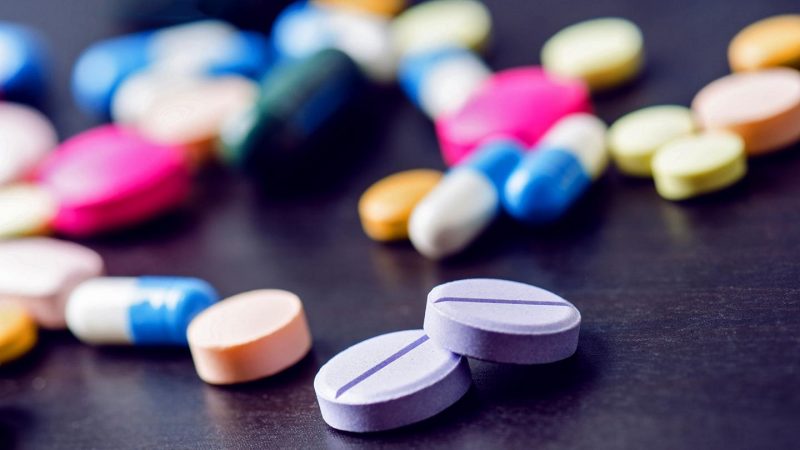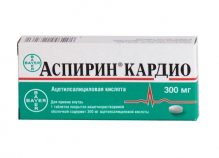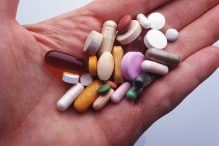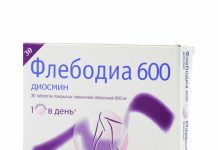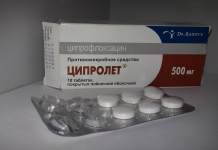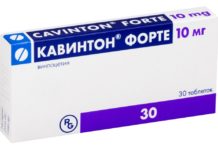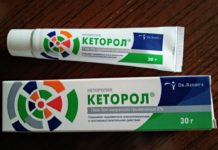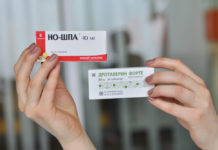"Aspirin Cardio" is, in fact, acetylsalicylic acid, available in any home medicine cabinet. Very often this is a non-steroidal anti-inflammatory - the first assistant for headaches and fever due to colds. But doctors use it much more widely, and the second word in the name makes it clear in which area.
Material Content:
- 1 Composition, release form and packaging
- 2 Pharmacological action, pharmacodynamics and pharmacokinetics
- 3 Why is Aspirin Cardio prescribed?
- 4 Instructions for use and dosage
- 5 During pregnancy and lactation
- 6 Can I drink alcohol while taking Aspirin Cardio?
- 7 Drug interaction
- 8 Contraindications, side effects and overdose
- 9 Analogues of the drug
Composition, release form and packaging
The drug is a white tablet with a protective coating. On the fault, a dense, uniform core of acetylsalicylic acid is found in combination with additional elements:
- cellulose powder;
- corn starch.
Coverage consists of:
- polysorbate 80;
- triethyl citrate;
- talcum powder;
- sodium lauryl sulfate;
- Eudragit L30D (a copolymer of ethyl acrylate and methacrylic acid).
Tablets of 0.1 or 0.3 g are sealed in blisters-plates of 10 pieces. The plates are packed in a cardboard box of two or four pieces.
Pharmacological action, pharmacodynamics and pharmacokinetics
Out of habit, we consider the main goal of Aspirin to reduce fever and pain with colds. In fact, this is a “side” effect, and the main goal of acetylsalicylic acid is to make blood less thick.
The substance inhibits the production of thromboxane A2, which prevents platelets from sticking together, which means that it prevents clotting of blood vessels by blood clots that are life-threatening.Increases the ability of blood plasma to fibrinolysis (the so-called natural dissolution of blood clots and clots during blood coagulation), reducing the proportion of coagulation factors. It blocks prostaglandinsynthetase, which is involved in the production of inflammation hormones - prostaglandins. Slightly reduces the reaction of nerve endings to inflammation, reducing the number of relevant mediators (substances that cause painful changes).
A huge advantage compared to drugs of this kind of action is that Aspirin Cardio dissolves rather quickly, is absorbed and mixed with blood, disperses throughout the body and begins to act. The positive aspects include the fact that the shell prevents the acid from being released directly in the stomach. This occurs in the small intestine and duodenum. So, unlike the usual Aspirin, Aspirin Cardio takes two hours to fully mix with the bloodstream.
On the way from the intestine to the liver, half of the acetylsalicylic acid is broken down into the glycine conjugates of salicylic and gentisic acid. They are metabolized by the kidneys. The higher the dose, the longer the half-life process. But it begins already 20 minutes after the peak of accumulation of substances in the blood plasma.
Acid easily overcomes all the natural obstacles of the human body, enters the articular voids, fluid of the spinal cord. During pregnancy, it is found in the blood of the fetus, while breastfeeding, it enters the baby along with milk.
Why is Aspirin Cardio prescribed?
Indications for the use of Aspirin Cardio are all ailments in which there is a risk of clogging of blood vessels or blood clots are formed too actively. Among the most common reasons to be treated with this drug:
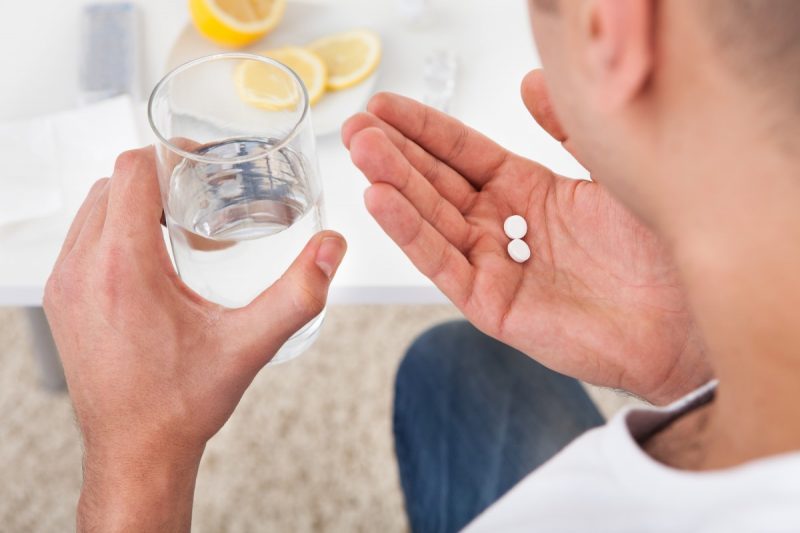
- unstable angina pectoris;
- stroke prevention;
- coronary heart disease of any shape;
- transient ischemic attacks;
- myocardial infarction in acute form or in people with diabetes mellitus, arterial hypertension (constantly high blood pressure);
- prevention of thrombosis and embolism (blockage of blood vessels by gas bubbles) as a result of surgical interventions;
- prevention of clogging of deep veins, as well as gas accumulation in the pulmonary artery in the postoperative phase;
- the use of hormonal and other drugs that can thicken blood.
In addition, Aspirin Cardio is used when prevention of blood flow problems in the brain is needed.
Instructions for use and dosage
Like any medication, Aspirin Cardio should not be swallowed just because you yourself made that decision. The manual indicates the method of use, once a day with a large volume of water, and standard servings:
- risk of recurrent heart attack - 100–300 mg;
- unstable angina and a high risk of severe heart attack - the same dose, and the first pill should be swallowed immediately, but it is better not to whole, as recommended in all other situations, but chewing well;
- developed heart attack - 200-300 mg per day for a month to maintain the necessary blood consistency;
- prevention of clogging of blood vessels leading to damage to the heart muscle in patients at risk (diabetes, hypertension, etc.) - 100 mg per day, or 300 mg once every 2 days;
- after surgical manipulations on the vessels - 100-300 mg daily;
- prevention of blood clots in deep veins - 100-200 mg every day or 300 times in two days;
- postoperative prevention of the appearance of gas bubbles in the pulmonary artery - the scheme is the same as in the previous paragraph.
If it happened that you forgot to drink the pill on time, do it the very minute you remember. The main thing is that the violation of the scheme does not become a habit.
The dosage, duration of the course of therapy is determined exclusively by the doctor, individually in each case. How long it takes to be treated depends on the diagnosis. Usually a lot of time is required.
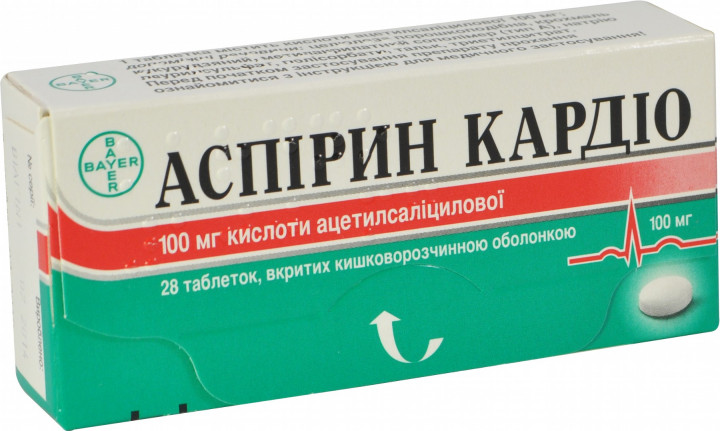
During pregnancy and lactation
Pregnancy is a period when you need to be extremely careful about taking any medicine. Especially in view of the danger that its components can adversely affect a baby developing in the womb. Aspirin Cardio is no exception. A doctor can write it out to a woman who is expecting a baby’s birth only if absolutely necessary, and only after comparing the benefits to the mother and the likely damage to the baby. In the second trimester, the use of this medication is allowed. However, in the smallest doses and in a short time. In the period of the first and third it is prohibited at all. What could be the consequences:
- Risk of miscarriage.
- Longer birth, slower uterine contractions, increased bleeding.
- Cardiovascular malformation in a child (congenital pathological connection between veins and arteries).
- Increased threat of gastroschisis (a congenital defect in the anterior abdominal wall).
- Early closure of the ductus arteriosus in the fetus.
- Problems in the baby with kidney function, which can lead to kidney failure.
The ban on Aspirin Cardio also applies to mothers who breastfeed. The accumulation in milk of salicylates even exceeds the volume of these substances in the blood plasma of a woman. So for some time the crumbs will have to be transferred to artificial mixtures.

Can I drink alcohol while taking Aspirin Cardio?
Acetylsalicylic acid and alcohol are absolute antagonists. In the human body, their combination in the literal sense of the word is destructive. The first gastrointestinal tract suffers from this, erosion and wounds appear in the stomach, and internal bleeding can develop.
The likely consequences are anemia, high blood pressure, and fainting.
Even a sip of alcohol along with Aspirin Cardio can be fatal to the liver. Ethanol under the influence of a drug is able to provoke organ overload and tissue necrosis.
If for the patient a complete rejection of alcohol is not possible, it is better to take the pill at least a couple of hours before the alleged libation, and drink it with water. When taking the medicine “before” did not work out, then “after” should take place no earlier than six hours later. At the same time, it does not matter how much alcohol was drunk the day before.
Drug interaction
During therapy with “Aspirin Cardio”, all medications that are used in parallel with it should be considered. This is due to the following factors:
- it enhances the effect of sugar-lowering instruments (insulin and sulfonylurea derivatives);
- any anticoagulants (anti-blood clotting agents) and antiplatelet agents (drugs that reduce the adhesion of red blood cells and platelets) together with Aspirin Cardio increase the risk of bleeding;
- valproic acid acquires increased toxicity;
- the kidneys remove digoxin more slowly, which threatens it with an excess;
- the effect of diuretics (diuretics) and uricosuric (slowing down the formation of uric acid and accelerating its output) agents is weakened;
- Ibuprofen reduces the effect of Aspirin Cardio on the cardiovascular system;
- combination with systemic glucocorticosteroids (with the exception of Hydrocortisone and substitutes for Addison's disease) inhibits the effects of salicylates.
Given the above, the doctor, prescribing "Aspirin Cardio", must necessarily have information about what other medicines the patient uses.
Contraindications, side effects and overdose
Although Aspirin Cardio is classified as the safest medicine, there are still situations where it will do nothing but harm. They can not be treated with:
- hypersensitivity to any component;
- past or present asthma triggered by salicylates;
- severe heart failure;
- severe renal dysfunction;
- stomach ulcer or duodenal ulcer;
- hemorrhagic diathesis, characterized by a tendency to subcutaneous hemorrhage due to impaired blood coagulation;
- in the first and last trimester of pregnancy.
Even if you don’t have anything like it, you need to know that sometimes unpleasant concomitant effects appear - in the form of attacks of nausea and vomiting, abdominal pain, temporary disruption of blood flow in the intestinal mucosa.
Long-term use of large doses can result in erosion in the stomach, and in some cases, gastric bleeding. Very rarely, but there have been cases of hypoglycemia (a sharp drop in blood glucose), kidney problems and multimorphic erythema (acute skin ailment with rashes).
Excess medication in the body is also fraught with complications. Tinnitus and dizziness may occur. Probable nausea and vomiting, pain in the stomach.
Analogues of the drug
When for certain reasons this drug cannot be drunk, the doctor will select a similar medicine. These may be such analogues of Aspirin Cardio:
- "Anopyrine";
- "Reocard";
- "Clopidogrel";
- "Ticlopidine";
- "Magnikor."
If you have a choice which is better, “Aspirin Cardio” or “Aspirin” is traditional, you should know that in the latter there are only two additional ingredients - cellulose and corn starch. And the tablets of the first, as is clear from the description in the first section, are coated with a protective coating. It does not allow acetylsalicylic acid to dissolve directly in the stomach and injure its mucous membrane.
What is the difference between Aspirin Cardio and Cardiomagnyl, you can understand by paying attention to the components of the drugs. The second one does not have a protective coating, but the ingredients include magnesium hydroxide. It is he, enveloping the walls of the stomach, and protects him from irritations that aggressive acid can cause.


